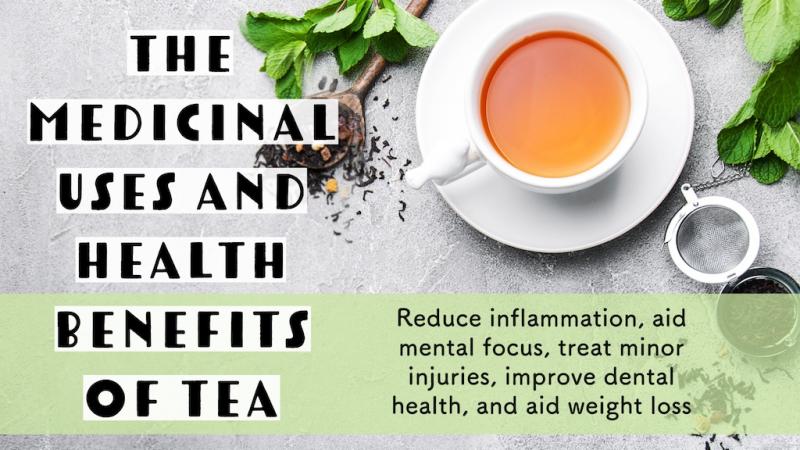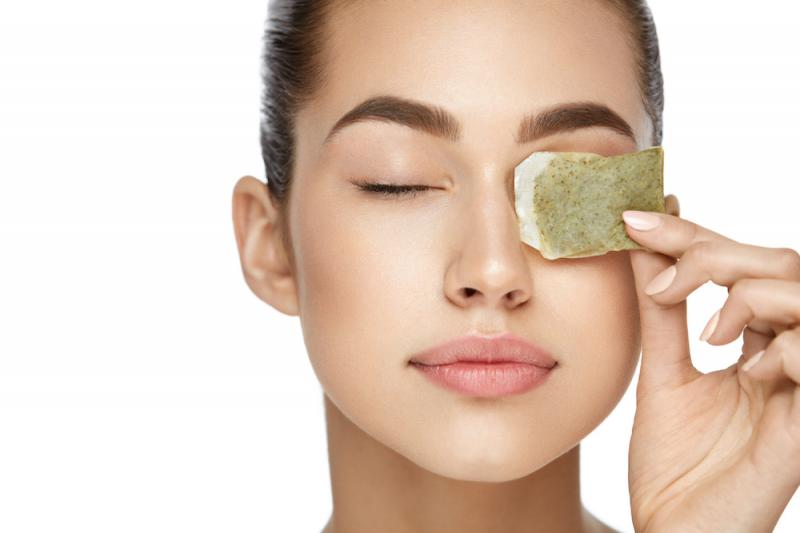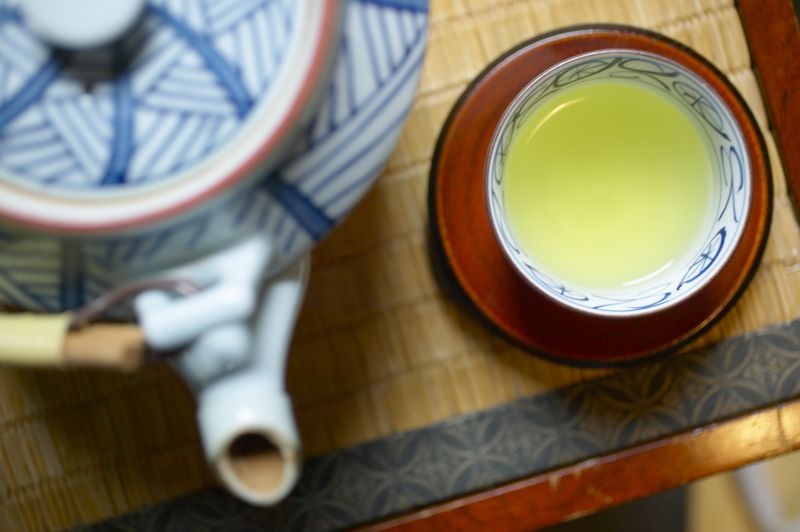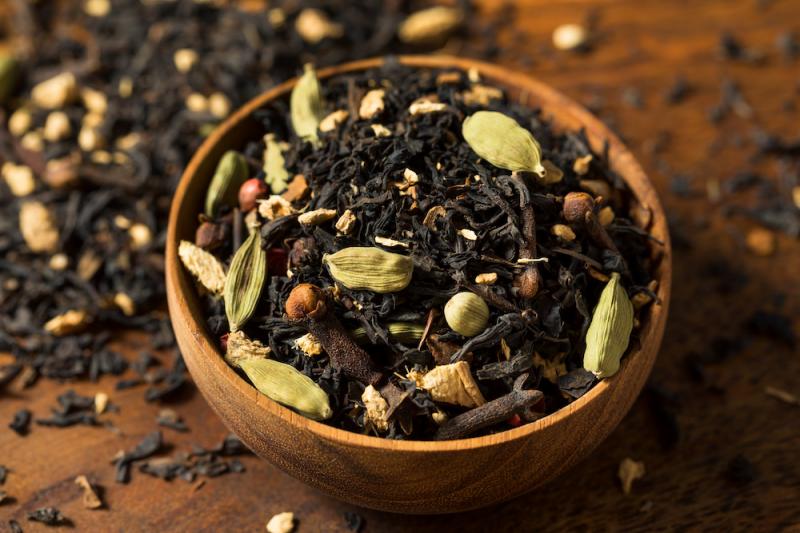
The first time I tried tea (Camellia sinensis) was as a child. I was sick and our family doctor told my mother to make me drink some as a medicine. I didn’t like it and never tried drinking it again until I went to China in 1986 at the age of thirty-two. I was there for three and a half weeks and pretty much the only things to drink were alcoholic beverages, sodas, and tea. I normally didn’t drink any of these things, but I needed to hydrate with something, so I drank the tea and the sodas.
Although I grew up in a religion where we didn’t drink tea, coffee, or alcoholic beverages, I don’t believe that drinking green tea is harmful to one’s health, nor is moderate use of coffee, wine, or beer. All of these beverages have some positive health benefits when used prudently, but tea is probably the healthiest of them all.
Tea is the most widely consumed beverage in the world and it has many potential health benefits. For starters, it has powerful antioxidant properties. It may also aid mental alertness, fight fatigue, and may aid in weight loss. It even appears to help fight cavities and gum disease. Which is why I want to talk about how tea can be used as a medicine.
Tea and Mental Focus
 Like coffee and cola drinks, tea contains caffeine, but not as much as the latter. It’s also less likely to make you jittery or anxious. That’s because tea contains a unique amino acid, l-theanine, which has a calming effect and can even aid sleep. So, if you need something to help you stay awake and alert, tea is probably the best choice among these caffeinated beverages.
Like coffee and cola drinks, tea contains caffeine, but not as much as the latter. It’s also less likely to make you jittery or anxious. That’s because tea contains a unique amino acid, l-theanine, which has a calming effect and can even aid sleep. So, if you need something to help you stay awake and alert, tea is probably the best choice among these caffeinated beverages.
Black tea comes from the same plant as green tea but it is allowed to oxidize which turns the tea leaves black. In traditional Chinese medicine (TCM), black tea is used to revive the shen (spirit) and clear the head. In TCM, it can be used alone, or in combination with other herbs, to aid mental focus, help to overcome fatigue, and relieve dizziness. Here in the West you’ll often see it as an ingredient in herbal formulas designed to overcome fatigue, and aid concentration and mental focus.
L-theanine is also used as a supplement. It is often included in sleep formulas, but it also helps to reduce anxiety and boost mental clarity. The combination of caffeine and l-threanine in tea, appears to improve mental focus without being overstimulating.
An Astringent Remedy
 Tea is an astringent herb, which means it contains tannins. Both the tannins in it and the antioxidants it contains make it useful as a topical remedy to reduce swelling and inflammation. I use green tea bags to make compresses by dipping them in hot water just long enough to wet and warm them. I make sure the tea bag is not too hot, just warm, and place it over the afflicted area.
Tea is an astringent herb, which means it contains tannins. Both the tannins in it and the antioxidants it contains make it useful as a topical remedy to reduce swelling and inflammation. I use green tea bags to make compresses by dipping them in hot water just long enough to wet and warm them. I make sure the tea bag is not too hot, just warm, and place it over the afflicted area.
I’ve used warm tea bags as a compress for red, irritated eyes and even to help heal conjunctivitis. You just place it over the closed eyelid. Tea bags also make a good compress for insect bites and stings, and minor skin irritations.
Tea and the Digestive Tract
The astringent nature of tea makes it useful as a remedy for settling the stomach where there is nausea, vomiting, and mild diarrhea. It can be used along with peppermint to settle the stomach after throwing up. This is also one of the indications for green tea in TCM. I’m also pretty sure that’s what my mom gave to me when I was a child.
Black tea also appears to aid the digestion of fatty foods. I’ve noticed that drinking some tea when eating at a restaurant where the food is somewhat greasy helps to clear the palate and seems to make the food digest better.
Tea as an Aid to Weight Loss
 In the early 1990s, there was a fad going around where people were using a combination of Chinese ephedra, green tea, and willow bark to help lose weight. This was not a good practice and ultimately wound up getting ephedra banned.
In the early 1990s, there was a fad going around where people were using a combination of Chinese ephedra, green tea, and willow bark to help lose weight. This was not a good practice and ultimately wound up getting ephedra banned.
However, there is some evidence that drinking tea can help with weight loss. It certainly could help to curb appetite and boost metabolism. And it is recognized in TCM as an aid to overcoming obesity. So, I think the practice of including tea, particularly green tea, in weight loss formulas may be helpful. But I would only recommend these supplements as part of a comprehensive weight management program.
Antioxidants in Green Tea
 All forms of tea (green, black, white, and oolong) are rich in polyphenols that act as antioxidants. The specific polyphenols in green tea are called catechins and the most well-known and abundant catechin in green tea is epigallocatechin-3-gallate (EGCG). Research suggests that EGCG can reduce chronic inflammation which can help prevent many chronic diseases, including heart disease and degenerative diseases of the brain.
All forms of tea (green, black, white, and oolong) are rich in polyphenols that act as antioxidants. The specific polyphenols in green tea are called catechins and the most well-known and abundant catechin in green tea is epigallocatechin-3-gallate (EGCG). Research suggests that EGCG can reduce chronic inflammation which can help prevent many chronic diseases, including heart disease and degenerative diseases of the brain.
EGCG acts as a zinc ionophore, just like quercitin. So, a standardized extract of green tea containing EGCG could be taken with zinc to help fight viral infections. There are some risks, however, with taking EGCG as a supplement in high doses. It has been associated with dizziness, anemia, low blood sugar, and liver problems.
Tea and Dental Health
Tea is antimicrobial and can be helpful for dental health. It not only inhibits the growth of bacteria associated with gum disease, bad breath, and cavities. The astringent nature of green tea can be used to tone up the gums. I've successfully used and recommend astringent herbs as mouthwashes or toothpowders to tone up spongy bleeding gums and you can certainly use green tea as a mouthwash to achieve this.
Tea also contains natural fluorine. I have serious concerns about the use of fluoride (not the element fluorine) in dental care because I believe the form of fluorine being used is toxic, but I don't think that the natural fluorine in green tea is toxic. Therefore, there is a possibility that tea will also strengthen tooth enamel.
Using Tea
 Obviously, the best way to use tea is to drink it as a tea or part of a tea blend. You can also take standardized extracts or use it as part of a formula.
Obviously, the best way to use tea is to drink it as a tea or part of a tea blend. You can also take standardized extracts or use it as part of a formula.
Although I'm not a big tea drinker, I’m fond of chai tea, which combines tea with spices like ginger, cardamom, fennel, cinnamon, clove, and black pepper. Chai tea is not only a great energy booster, but it’s also loaded with antioxidants and stimulates digestion and intestinal motility to ease gas and bloating. You typically add a little milk to the tea, which binds the tannins reducing the astringency. I also like making it with dairy alternatives like almond milk or oat milk.
Steven's Articles
-

-
Barberry and Healthy Personal Boundaries
A thorny shrub for fighting infections and supporting…
December
-

-
The Evidence for Berberine
A yellow alkaloid found in traditional infection-fighting…
-

-
The Sensible Use of Caffeinated Herbs
Kola nuts, guarana, and yerba mate and other herbs…
-

-
The Health Benefits and Problems with Coffee
This popular caffeinated beverage can be beneficial…
October
-

-
Understanding Caffeine & Cellular Adaptation
Preserving the power of caffeine's buzz and the…
September
-

-
Horseradish
A pungent spice for aiding protein metabolism…
-

-
Banaba or Crepe Myrtle
A beautiful tree from Southeast Asia whose leaves…
August
-

-
Monkeyflowers
Flower essences to help see ourselves more clearly…
-

-
Mariposa Lilies
Strengthening the bond between mother and child…
-

-
The Noble Bay Leaf
A common kitchen herb for aiding digestion and…
-

-
Epimedium: Horny Goat Weed
A circulatory stimulant and kidney yang tonic…
July
-

-
The Medicinal and Nutritional Benefits of Apricots
A nutritious fruit and valuable medicinal seed for coughs
-

-
Dogwoods
Asian dogwood is used to stop excessive discharge,…
June
-

-
Neem: The Village Pharmacy
A popular Ayurvedic remedy for dental and immune…
-

-
Spilanthes: The Toothache Plant
A traditional remedy for teeth and gums, as well…

